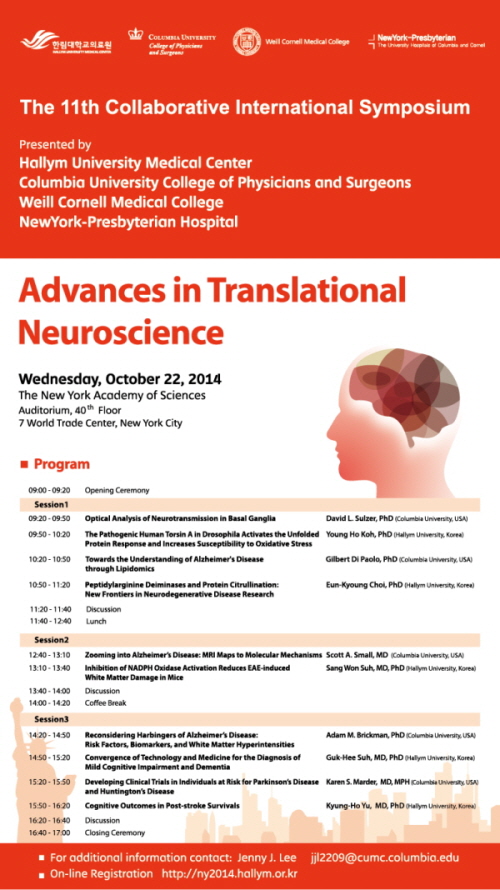The 11th Hallym-Columbia-Weill Cornell-NYP Symposium on neuroscience takes place in New York on Oct. 22
No.4161 Date2014-10-20 Hit 28462
The 11th Hallym-Columbia-Weill Cornell-NYP Symposium on neuroscience takes place in New York on Oct. 22
No.4161 Date2014-10-20 Hit 28462
Korea’s Hallym University Medical Center (HUMC) is hosting the 11th Hallym-Columbia-Weill Cornell-NYP Symposium at New York Academy of Sciences in New York City on October 22, 2014, in conjunction with Columbia University College of Physicians and Surgeons, Weill Cornell Medical College and NewYork-Presbyterian Hospital.
Under the theme of “Advances in Translational Neuroscience Symposium,” the symposium will bring together the world’s leading scientists and physicians to provide cutting-edge findings in neurodegenerative diseases and share their research experiences.
This is the second occasion that HUMC is having a neuroscience symposium in New York since it successfully held the 5th Hallym-Columbia-Weill Cornell-NYP Symposium themed “Neurodegenerative Diseases: Genetics, Biological and Vascular Mechanisms” in 2007.

Among the Hallym dignitaries who will participate in the symposium are Dr. Dai-Won Yoon, Chairman of Ilsong Educational Foundation, Dr. Hae-Ran Lee, President of Hallym University Medical Center, and Dr. Yong-Sun Kim, Executive Vice President for Health & Biomedical Sciences at Hallym University.
Hallym’s collaboration with the Columbia University College of Physicians and Surgeons, Weill Cornell Medical College and NewYork-Presbyterian Hospital goes back to the year 2004 when Hallym signed an international affiliation agreement Columbia University College of Physicians to promote exchanges of professors and students, collaborative research and joint academic meetings.
Since then, the institutions have collaborated on a series of annual symposium, with this year being the eleventh. The ten previous annual conferences have addressed a wide array of medical issues including geriatric medicine, obesity and metabolic syndrome, innovative surgery and medicine, pediatrics, neurodegenerative diseases, arthroplasty and spine surgery, cardiovascular diseases, pulmonary diseases, gastrointestinal cancer and prematurity.
The specific programs of the 11th symposium including speakers and topics are as follows:
■Session 1
1. Optical Analysis of Neurotransmission in Basal Ganglia
(David L. Sulzer, PhD, Professor, Departments of Psychiatry, Neurology, and Pharmacology, Columbia University Medical Center)
2. The Pathogenic Human Torsin A in Drosophila Activates the Unfolded Protein Response andIncreases Susceptibility to Oxidative Stress
(Young Ho Koh, PhD, Professor, Lab. of Molecular Neurogenetics, Ilsong Institute of Life Science, Hallym University)
3. Towards the Understanding of Alzheimer's Disease through Lipidomics
(Gilbert Di Paolo, PhD, Associate Professor, Department of Pathology and Cell Biology, Columbia University Medical Center, Taub Institute for Research on Alzheimer’s Disease and the Aging Brain)
4. Peptidylarginine Deiminases and Protein Citrullination: New Frontiers in Neurodegenerative Disease Research
(Eun-Kyoung Choi, PhD, Professor, Lab. of Cellular Aging and Neurodegeneration, Ilsong Institute of Life Science, Hallym University)
■Session 2
5. Zooming into Alzheimer’s Disease: MRI Maps to Molecular Mechanisms
(Scott A. Small, MD, Boris and Rose Katz Professor of Neurology, Departments of Neurology and Radiology Columbia University Medical Center)
6. Inhibition of NADPH Oxidase Activation Reduces EAE-induced White Matter Damage in Mice
(Sang Won Suh, MD, PhD, Professor, Department of Physiology, Hallym University College of Medicine)
■Session 3
7. Reconsidering Harbingers of Alzheimer’s Disease: Risk Factors, Biomarkers, and White Matter Hyperintensities
(Adam M. Brickman, PhD, Associate Professor of Neuropsychology, Columbia University Medical Center)
8. Convergence of Technology and Medicine for the Diagnosis of Mild Cognitive Impairment and Dementia
(Guk-Hee Suh, MD, PhD, Professor, Department of Psychiatry, Hallym University College of Medicine)
9. Developing Clinical Trials in Individuals at Risk for Parkinson’s Disease and Huntington’s Disease
(Karen S. Marder, MD, MPH, Sally Kerlin Professor of Neurology (in the Sergievsky Center, the Taub Institute, and in Psychiatry), Columbia University Medical Center)
10. Cognitive Outcomes in Post-stroke Survivals
(Kyung-Ho Yu, MD, PhD, Professor, Department of Neurology, Hallym University College of Medicine)
By Miju Kim, Int’l Cooperation Team, HUMC (miju@hallym.or.kr)